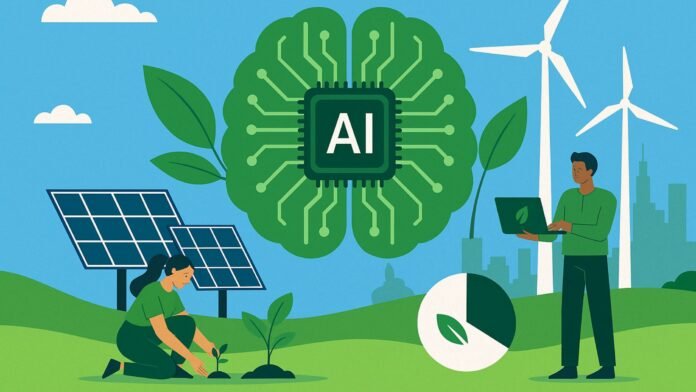India’s Green Leap: How AI is Powering a Sustainable Future, From Startups to Tech Giants
India is rapidly emerging as a global leader in leveraging Artificial Intelligence (AI) to address pressing environmental challenges and drive sustainable development. From agile climate-tech startups to established IT behemoths, the nation is weaving AI into the very fabric of its green goals, demonstrating a powerful commitment to both economic transformation and ecological conscience. A striking 64% of Indian companies are now actively deploying AI to boost their sustainability efforts – the highest proportion among surveyed countries, according to IBM’s 2024 sustainability readiness study.
The Strategic Imperative: Why India is Embracing AI for Green Goals
India’s enthusiastic adoption of AI for sustainability is not merely a technological trend; it’s a strategic imperative driven by a unique confluence of factors:
- Mounting Climate Challenges: With rapid urbanization, resource depletion, and vulnerability to climate change impacts, India faces urgent environmental needs across sectors like air quality, water management, waste management, and agriculture.
- Digital Transformation Momentum: India’s digital economy accounted for nearly 12% of its national income in 2022-23, providing a strong foundation for integrating advanced technologies like AI into core business processes.
- Governmental Push: Initiatives like the IndiaAI Mission, with its significant allocation of ₹10,300 crore, and the establishment of AI Centres of Excellence in healthcare, agriculture, and sustainable cities, are empowering startups and researchers with world-class AI infrastructure and datasets.
- “Make AI in India, Make AI Work for India”: Prime Minister Narendra Modi’s vision emphasizes not only clean energy for AI but also AI that is efficient by design – “light on data, lean on compute power, and accessible to the broader developer community.” This holistic approach ensures widespread and impactful adoption.
Startups Leading the Charge: Innovation from the Ground Up
India’s vibrant climate-tech ecosystem boasts over 800 operational startups, which have collectively raised more than $3.6 billion since 2014. These agile innovators are at the forefront of applying AI to create tangible solutions:
- Carbon Removal & Monitoring: Startups like Alt Carbon are leading the charge in carbon removal technologies, combining geochemical innovation with environmental data platforms. Their “Atlas” platform monitors soil chemistry, water dynamics, and ecosystem health at high resolution, aiming to remove 5 million metric tons of CO2 by 2030 through enhanced rock weathering and soil improvement on farmland.
- Smart Agriculture: AI is revolutionizing farming practices to address India’s significant yield gap. Startups are using AI to:
- Assess soil health and recommend crops suitable for specific climatic conditions (pre-sowing).
- Monitor plant health with AI-driven sensors and drones, enabling precision disease management and optimizing resource use (during cultivation).
- Forecast market demand and optimize logistics to reduce post-harvest losses and boost farmer earnings. Initiatives in Andhra Pradesh have already shown AI-powered apps increasing crop yields by up to 30%.
- Waste Management: AI is transforming traditionally manual and hazardous waste management:
- Automated sorting systems: AI robotic arms with cameras and sensors identify and separate different waste materials, increasing efficiency and reducing contamination.
- Smart collection: Sensors and AI algorithms optimize waste collection routes, saving fuel and reducing carbon footprints.
- Plastic waste management: AI-driven hyperspectral imaging (HSI) can accurately classify plastic polymers for effective recycling, and AI models can design biodegradable alternatives and simulate optimal reuse pathways.
- Water Management: With severe water scarcity, AI is critical for efficient water resource management:
- Demand Forecasting: Predicting future water demand based on usage patterns, population, and weather.
- Leak Detection: Using machine learning to predict pipeline failures and detect leaks early.
- Water Quality Prediction: Analyzing water samples to forecast contamination levels.
- AI-powered sewage treatment plants: India has taken a groundbreaking step with its first AI-powered sewage treatment plant, automating pollutant detection, chemical dosing, and energy optimization for faster, more efficient, and eco-friendly operations.
- Renewable Energy & Efficiency: AI is enhancing energy efficiency and optimizing renewable energy integration. IT giants like Infosys, which achieved carbon neutrality in 2020 partly through AI-driven energy efficiency, exemplify this. New materials developed by Indian scientists, enhanced with rare-earth elements, are boosting supercapacitor performance for faster energy storage, crucial for large-scale renewable systems.
Giants and Government: Scaling Impact and Building Infrastructure
It’s not just startups making waves. Established IT giants and government initiatives are playing a pivotal role in scaling AI for sustainability:
- Corporate Responsibility: Large corporations are integrating AI into their ESG (Environmental, Social & Governance) goals, using platforms like EY’s ESG Compass for data automation, risk analytics, and benchmarking.
- Public-Private Partnerships: The collaboration between IIT-Kanpur’s Centre of Excellence in AI for Sustainable Cities and IBM to fight air pollution in Uttar Pradesh showcases how academia, industry, and government can co-create impactful, scalable innovations for environmental governance.
- National Infrastructure: The IndiaAI Mission is developing a high-end common computing facility with 18,693 GPUs, one of the most extensive globally, and an IndiaAI Dataset Platform for seamless access to high-quality, non-personal datasets.
The Road Ahead: Challenges and Opportunities
While the momentum is strong, challenges remain. These include concerns around data privacy, interoperability, ethical AI design (especially regarding deployment and inference emissions), and ensuring accessibility for developers relying on APIs or no-code platforms. The ongoing Times of India Social Impact Summit (July 11-12, 2025) is poised to address these themes: how to scale tech-enabled ESG and CSR efforts, ensure inclusive adoption, and drive measurable impact.
India’s journey demonstrates a powerful synergy between technological innovation and environmental stewardship. By embracing AI, from its burgeoning startup ecosystem to its established industrial players and supportive government, India is not just riding the AI wave; it’s steering it towards a profoundly sustainable future.
Are you a startup founder or innovator with a story to tell? We want to hear from you! Submit Your Startup to be featured on Taalk.com.








